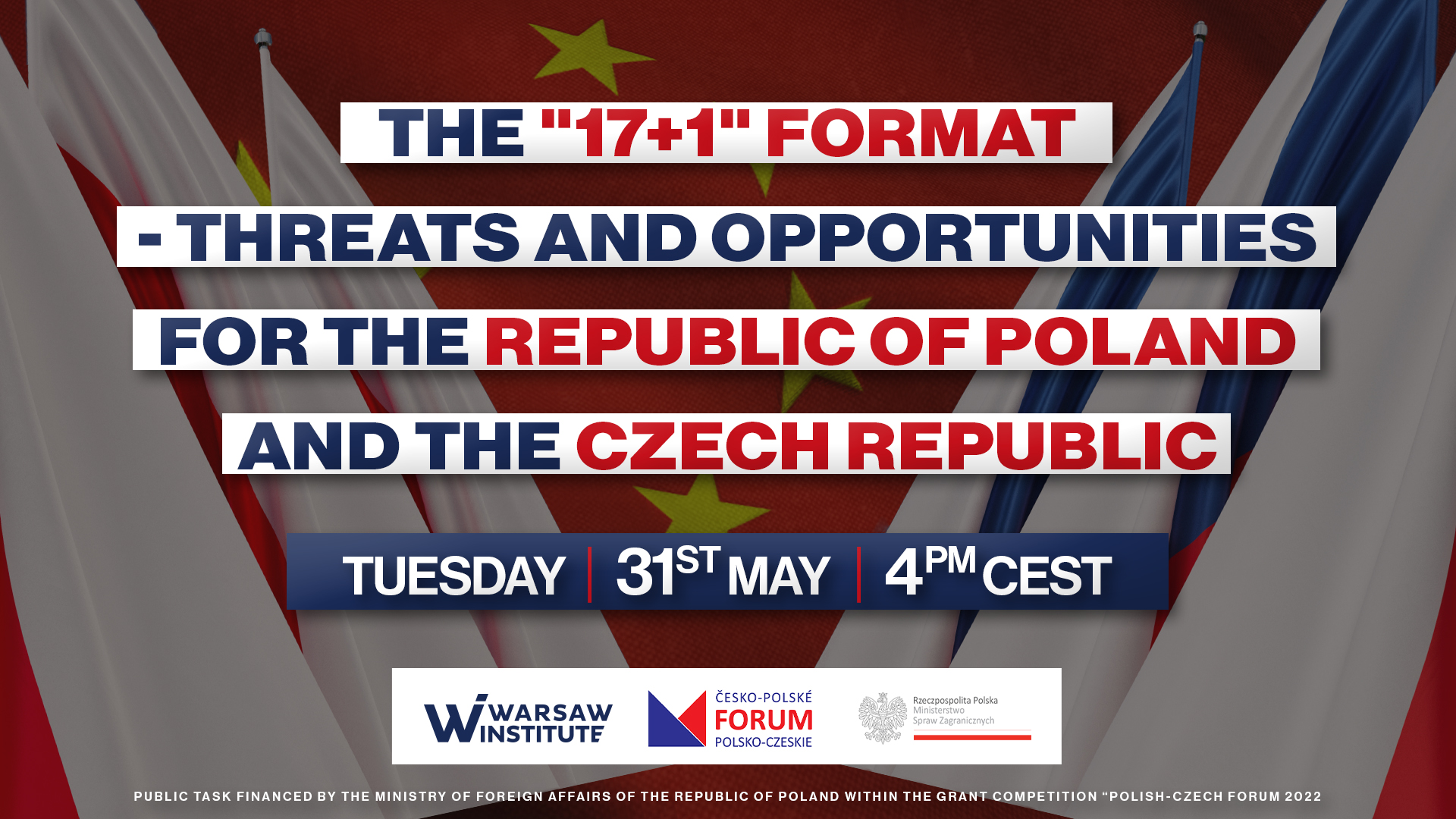OPINIONS
Date: 7 June 2022 Author: Wojciech Adamczyk
The “17+1” format – threats and opportunities for the Republic of Poland and the Czech Republic
On May 31, 2022 the “The” 17 + 1 “format – threats and opportunities for the Republic of Poland and the Czech Republic” debate took place, which was organized by the Warsaw Institute as part of a project financed in cooperation with the Ministry of Foreign Affairs of the Republic of Poland entitled ” Polish-Czech Forum ”. The debate was attended by the moderator Marcin Jerzewski, and two speakers, Warsaw Institute expert Wojciech Adamczyk, who represented the Polish side and David Plášek, the analyst of the Red Watch Program, representing the Czech side.

The meeting began with a question from Marcin Jerzewski to Wojciech Adamczyk on the current state of relations between Poland and China, including the Czech Republic. Wojciech Adamczyk stated in a few sentences that:
“The countries of the Central and Eastern Europe region openly support Ukraine in the war with Russia, while China, although so far rather indirectly, supports Russia. Taking into account the macro situation in the region, I do not see any opportunities to intensify these relations at the moment.”
Later in his speech, Adamczyk turned to issues related to the investment agreement between China and the European Union, where, as he emphasized, “it should be considered whether the agreement signed in 2020 is simply dead, in particular after the Chinese refusal to condemn the Russian invasion of Ukraine. ”
In response to the same question, David Piasek, focusing on Czech-Chinese relations, emphasized that the instability of relations between the two countries is constituted by “three important events that speak of these relations, such as: last year’s elections in the Czech Republic, the pandemic, and disappointment resulting from unrealized Czech investments.”
The next questions by Marcin Jerzewski concerned the more enthusiastic approach of the Polish government to cooperation in the 16 + 1 format compared to countries such as Lithuania or the Czech Republic. Here, Wojciech Adamczyk tried to draw attention to the status of Poland’s position as a regional leader, which has great ambitions related to the Belt and Road Initiative, and the largest beneficiary of this format. In turn, the question addressed to David Plasek concerned the establishment of the New Silk Road Institute in the Czech Republic in 2015 and the role of the institute in Czech-Chinese relations, which David Plasek treats “as a result of intensified relations between the two countries and as part of the lobby of certain elite circles in the Czech Republic, which was basically the result of decisions made by only a few people in the country, including the president. This institute is simply part of the lobby promoting Chinese investment in the Czech Republic.”
Later, Marcin Jerzewski asked a question about the reaction of the Polish government after Lithuania’s decision to abandon the 16 + 1 format. In his speech, Adamczyk stated that “despite the debate, in which it was considered whether other countries would decide to follow Lithuania’s footsteps, in my opinion, the rest of the countries will probably remain members of the cooperation format. It is worth noting that just a few days after the Lithuanian decision, the Polish minister of foreign affairs, on a trip to China, reassured Chinese partners of the importance of the format as the basis for relations between the European Union and China. I think the same is true of China.” In his reply, David Piasek, sharing the opinion of Wojciech Adamczyk, added that “at this moment, in any of the official statements or documents, there are no signals of such plans”.
Moving on to the next questions, the debate touched upon such issues as the shaping of the relationship of some 16 + 1 Member States towards Taiwan and the intensified relations created due to the pandemic. In this regard, Adamczyk noted that “the activity of some 16 + 1 countries openly supporting Taiwan weakens the essence of the formula of cooperation with China,” while David Plasek stated that “regardless of whether it was decided to ignore the issue of human rights in China, the end of after all, being pragmatic, you can see that Taiwan is the winner in terms of its business activity. ”
Before the end of the debate, there were questions from the audience in which Wojciech Adamczyk answered the question of how to effectively protect yourself against digital espionage in relations with China. Wojciech Adamczyk, noted that the most important issues for all governments is to have and secure critical infrastructure. On the other hand, David Plasek drew attention to new legal regulations introduced by states, including the Czech Republic, that help to monitor foreign investments.
The project is financed in cooperation with the Ministry of Foreign Affairs of the Republic of Poland under the title “Polish-Czech Forum”.
Support Us
If content prepared by Warsaw Institute team is useful for you, please support our actions. Donations from private persons are necessary for the continuation of our mission.
All texts published by the Warsaw Institute Foundation may be disseminated on the condition that their origin is credited. Images may not be used without permission.















